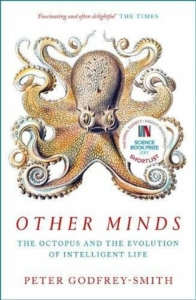OTHER MINDS | THE OCTOPUS AND THE EVOLUTION OF INTELLIGENT LIFE | PETER GODFREY-SMITH | 2016 | NON FICTION
Sometimes we’re led down a path to a book that fits neatly into our current thinking. For me, this is one of those books. It seems that recently there’s been an upsurge in octopus documentaries, YouTube videos, social media posts, books and media articles. It seems as if we have just discovered an appreciation for these astonishing creatures.
I’m no scientist and I feel lucky that Peter Godfrey-Smith has couched this wonderful work in terms and language and hypotheses that I could (albeit after a few re-readings of a number of paragraphs) understand and see where he was going.
Along with their cousins, cuttlefish and squid, octopuses are now firmly on the research agenda not only for their squishy, graceful neon-flashing bodies and arms but also for their intelligence, their short lives and relatively meagre social lives. And speaking of short lives, did you know they generally only live for two years? Apparently during their evolution from ditching their hard shell covering for soft vulnerable bodies they put so much into developing their ability to stay safe that they sacrificed longevity.
They’re all part of the cephalopod family and the author, who by the way is a distinguished philosopher of science and an ace scuba diver, posits that the octopus is the closest we will come to meeting an intelligent alien. The book’s chapters are composed of a theory of the evolution of the human mind and then, how that is contrasted with cephalopods.
I was intrigued by such theories as perceptual constancies which are, “abilities an animal has to re-identify objects despite changes in viewing conditions—distance, lighting and so on”. This means that animals, us included, perceive external objects as external; that is, the object stays the same when our vantage point changes. Apparently, our brain compensates minutely and instantly to these changes, making adjustments on the fly. Fascinating stuff. Octopuses appear to do the same when they change colour rapidly to changing conditions. It seems to me that the octopus shows its remarkable brain working on the outside. But of course, I’m not a scientist.
This book gained very mixed reviews on release. To the scientists it seems it’s a bit of a light read. To cephalopod lovers it gives wonderful insights into this rare family of intelligent beings.

